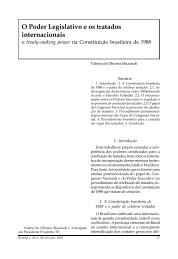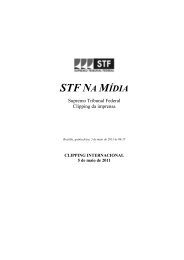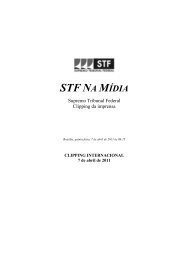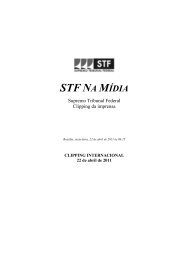STF NA MÍDIA
STF NA MÍDIA
STF NA MÍDIA
Create successful ePaper yourself
Turn your PDF publications into a flip-book with our unique Google optimized e-Paper software.
But Mr. Sheehan’s friends<br />
saw another side of him. He<br />
retired in 2002 from the New<br />
York Police Department, and<br />
they said he appeared to be a<br />
devoted father who was frequently<br />
seen by his wife’s<br />
side in church, and who also<br />
worked with youth teams at<br />
his children’s school. After<br />
the terrorist attacks of Sept.<br />
11, he helped sift through the<br />
rubble at ground zero, they<br />
said.<br />
Prosecutors typically reject<br />
the battered-woman defense<br />
by arguing that a person in<br />
Ms. Sheehan’s position had<br />
the opportunity to seek help.<br />
An abusive relationship, however<br />
egregious, they argue,<br />
does not justify homicide.<br />
But friends of Ms. Sheehan<br />
say she was too afraid to report<br />
her abuse to the police<br />
since her husband had worked<br />
in law enforcement.<br />
Legal experts said the success<br />
of the battered-woman<br />
defense was mixed.<br />
In November 2010, Shanique<br />
Simmons, a Bronx woman<br />
who had faced years of violent<br />
abuse from her husband,<br />
including rape, was acquitted<br />
on the grounds of selfdefense<br />
after she fatally stabbed<br />
him in the hallway outside<br />
her apartment. The husband<br />
was unarmed, but the<br />
jury concluded that Ms.<br />
Simmons, based on her past<br />
abuse, reasonably feared for<br />
her life.<br />
But in another case in the<br />
Bronx in 1991, a jury found a<br />
woman who had shot her<br />
abusive husband in the head<br />
when he was lying down<br />
guilty of murder.<br />
Holly Maguigan, a law professor<br />
at New York University<br />
Law School who specializes<br />
in abuse cases, noted<br />
that in cases in which abused<br />
women killed their husbands,<br />
they were typically convicted<br />
at the same rate as others<br />
accused of murder.<br />
She said that until feminism<br />
changed social attitudes a-<br />
bout abuse in the 1970s, battered<br />
women who killed their<br />
abusers in self-defense had<br />
been encouraged to plead<br />
insanity or were persuaded to<br />
plead guilty to lesser charges<br />
rather than risk going to trial.<br />
“Today, there has been a<br />
growing recognition that<br />
women who are victims of<br />
violence in some cases have<br />
no choice to kill or be killed,”<br />
she said. “But juries<br />
still can have a hard time<br />
understanding how a wife<br />
can kill her husband when<br />
she is supposed to be the<br />
cool-headed and nurturing<br />
one.”<br />
JUSTIÇA NO EXTERIOR •<br />
THE NEW YORK TIMES (US) • INTER<strong>NA</strong>TIO<strong>NA</strong>L • 18/9/2011<br />
In Blunt and Sometimes Crude Rap, a Strong Political Voice Emerges<br />
By ADAM NOSSITER<br />
DAKAR, Senegal — A revolution<br />
led by rappers says<br />
something about a country’s<br />
politics or its music, or maybe<br />
both.<br />
In Senegal, the political mainstream<br />
appears stagnant<br />
and the musicians anything<br />
but, which explains why laidback<br />
musicians with stage<br />
names like Fou Malade<br />
(“Crazy Sick Guy”) and Thiat<br />
(“Junior”) are leading a<br />
vigorous demonstration movement<br />
against the country’s<br />
octogenarian president, who<br />
does not want to leave office.<br />
The usual regional trappings<br />
of power — a $27 million<br />
monumental statue overlooking<br />
the capital, a new presidential<br />
plane, tinkering with<br />
the country’s Constitution<br />
— have not gone down well<br />
in a poor but proud West<br />
African country used to something<br />
better. They have<br />
led to a season of revolt, on<br />
the North African model, in<br />
this coastal country, a former<br />
French colony.<br />
There were riots this summer<br />
with tear gas and tire burnings,<br />
and several large-scale<br />
demonstrations, one of them<br />
even forcing President Abdoulaye<br />
Wade to back away<br />
S T F N A M Í D I A • 2 2 d e s e t e m b r o d e 2 0 1 1 . . . . . . . . . . . . . . . . . . . P Á G I N A 1 7 1
















